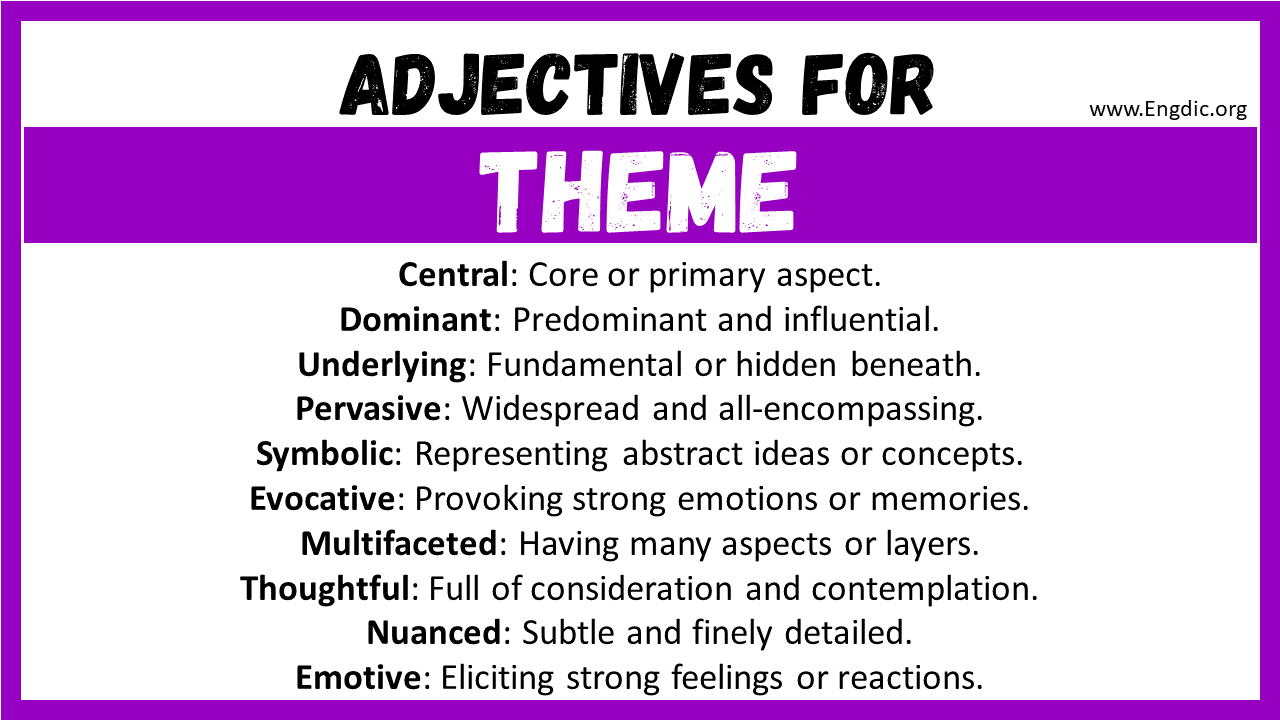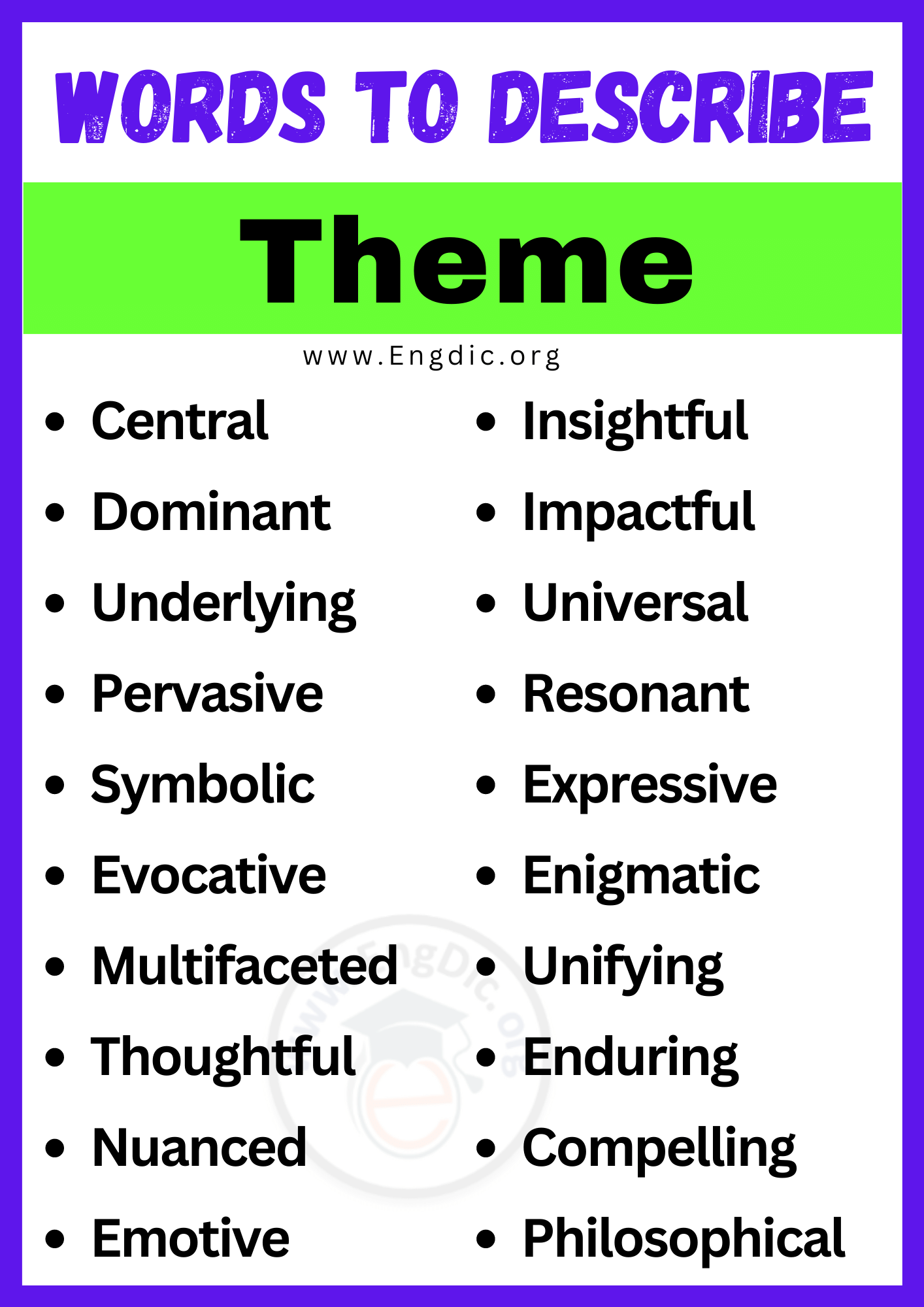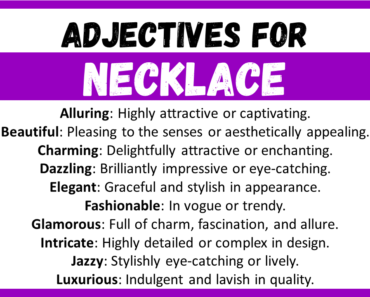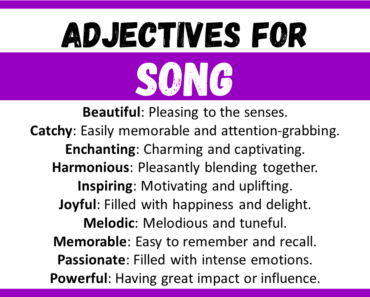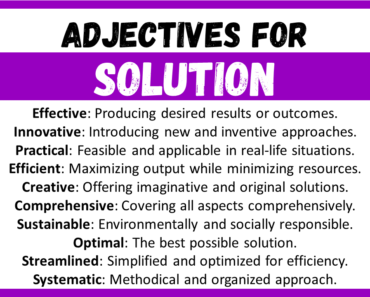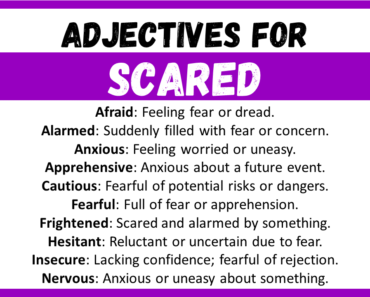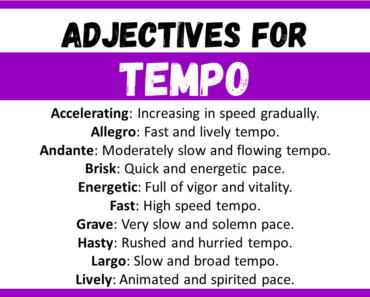Theme, in simple terms, refers to the central idea or message that an artistic work conveys to its audience. Whether in literature, movies, or visual arts, themes provide the backbone of the narrative and evoke emotions, thoughts, and reflections in the viewers or readers. Words used to describe themes are essential in analyzing and understanding the underlying concepts within a piece of art. This blog post delves into the significance of theme analysis and explores the diverse vocabulary used to articulate and unravel the profound meanings that lie beneath the surface of creative expressions.
Adjectives for Theme
Here are the 20 Most Popular adjectives for theme:
- Central
- Dominant
- Underlying
- Pervasive
- Symbolic
- Evocative
- Multifaceted
- Thoughtful
- Nuanced
- Emotive
- Insightful
- Impactful
- Universal
- Resonant
- Expressive
- Enigmatic
- Unifying
- Enduring
- Compelling
- Philosophical
Adjectives for Theme Of a Story:
- Captivating
- Thought-provoking
- Heartwarming
- Suspenseful
- Profound
- Inspirational
- Haunting
- Empowering
- Poignant
- Intriguing
Adjectives for Theme Park Rides:
- Thrilling
- Exhilarating
- Adrenaline-pumping
- Fantastical
- Unforgettable
- Entertaining
- Nerve-wracking
- Spectacular
- Immersive
- Dizzying
Words to Describe Theme with Meanings
- Central: Core or primary aspect.
- Dominant: Predominant and influential.
- Underlying: Fundamental or hidden beneath.
- Pervasive: Widespread and all-encompassing.
- Symbolic: Representing abstract ideas or concepts.
- Evocative: Provoking strong emotions or memories.
- Multifaceted: Having many aspects or layers.
- Thoughtful: Full of consideration and contemplation.
- Nuanced: Subtle and finely detailed.
- Emotive: Eliciting strong feelings or reactions.
- Insightful: Offering deep understanding and perception.
- Impactful: Making a significant impression or effect.
- Universal: Applicable to all, globally relevant.
- Resonant: Echos with significance or harmony.
- Expressive: Communicating emotions and ideas effectively.
- Enigmatic: Mysterious and puzzling in nature.
- Unifying: Bringing together different elements or ideas.
- Enduring: Long-lasting and persistent.
- Compelling: Convincing and persuasive.
- Philosophical: Concerned with fundamental truths and principles.
Example Sentences for Theme Adjectives
- The central theme revolves around love.
- Her dominant presence controlled the event.
- The underlying motive remained undisclosed.
- Fear was a pervasive emotion throughout.
- The story’s objects had symbolic meanings.
- His art was evocative of past memories.
- The problem was multifaceted, requiring teamwork.
- She gave a thoughtful response to criticism.
- The author’s writing style was nuanced and sophisticated.
- The movie’s ending was emotive, leaving viewers in tears.
- The speech offered an insightful analysis of the situation.
- The campaign had an impactful effect on society.
- The pursuit of happiness is a universal desire.
- The song’s lyrics had a resonant message.
- The actor’s expressive performance impressed the audience.
- The enigmatic painting left us questioning its meaning.
- The team’s unity had a unifying effect on their performance.
- The enduring legacy of a great leader.
- Her storytelling was compelling and held everyone’s attention.
- The philosopher presented philosophical ideas about existence.
Explore More Words:
FAQ’s
How to describe a theme in writing?
To describe the theme in writing, identify the central message or underlying idea conveyed by the story and use descriptive language to capture its essence.
What is the theme of a story?
The theme of a story is the fundamental concept or moral lesson that the narrative imparts to its readers, offering insights into human experiences and emotions.
Why is the theme important?
Themes provide depth and meaning to a story, connecting readers emotionally and intellectually, while also conveying universal truths and fostering deeper understanding.
What is theme and its types?
A theme is the main idea or subject explored in a story. It can be categorized into various types, such as love, friendship, power, justice, or coming-of-age, depending on the focus and message of the narrative.
